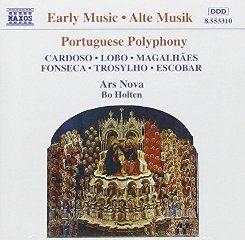Portuguese Polyphony (1995)
Portuguese Polyphony (1995)

Manuel Cardoso 1 Lamentatio 7:23 2 Magnificat Secundi Toni 11:32 Duarte Lôbo 3 Audivi Vocem De Caelo 3:23 4 Pater Peccavi 2:37 5 Vidi Aquam 4:11 Filipe de Magalhães Missa O Soberana Luz 6 Kyrie 3:32 7 Gloria 3:33 8 Credo 4:57 9 Sanctus 1:19 10 Benedictus 1:41 11 Agnus Dei 4:02 12 Commissa Mea Pavesco 4:19 Manuel Da Fonseca 13 Beata Viscera 4:37 Bartolomeo Trosylho 14 Circumdederunt Me 2:47 Pedro De Escobar 15 Clamabat Autem Mulier 3:08 Ars Nova Bo Holten – conductor
I'm not sure whether these days lovers of 16C Renaissance polyphonic choral music would still consider their favourite composers to come under the "Early Music" designation that Naxos uses here, in that Palestrina, Lassus, Tallis, de Victoria et al are surely now considered almost mainstream and not the recherché, minority interest such a term once implied. The great thing about bargain labels like Naxos and Regis is that one can now afford to experiment by dipping into music before the Baroque era and sampling both those composers and others more obscure in recordings by first class outfits such as Ars Nova, Oxford Camerata and Schola Cantorum of Oxford.
Nonetheless, the names of the composers here will probably be less familiar to the casual collector, although many will have heard gems such as Alonso Lobo's "Versa est in luctum", used as a filler in recitals by the Tallis, and think it's by the same Lobo as Duarte here; in fact, one was the Spanish Alonso and this other one is Portuguese.
I hope it will be understood as a compliment when I say that the Danish ensemble Ars Nova sounds very English in its timbres and textures and reminiscent of the Tallis Scholars' style. They are recorded here in a suitably reverberant church acoustic, but not too much so. Their other notable recording for Naxos is the masterpieces the "Lagrime di San Pietro" by Lassus; I also recommend the double bill of Portuguese Requiem Masses on Naxos by Jeremy Summerly and the Schola Cantorum of Oxford.
Ars Nova do not sound to be a large group; they must be around a dozen and thus some way from the OVPP ("One Voice per Part") fad - I am glad to say; a perfect compromise and one which does not let the vocal balance tip too far towards an overweening soprano line - a complaint made against the Sixteen and the Tallis which is sometimes justified. They hold the spread chords and piquant dissonances with absolutely true intonation and an impeccably steady line, while being very sparing of vibrato but avoiding any blaring or whining.
My favourite works here are the opening piece, the gloriously rich "Lamentio" by Cardoso with its wonderful suspended harmonies and the "Audivi vocem" by Lobo with its soaring sopranos. The concluding piece by Escobar is so clearly in an earlier genre, completely different in mode, its faintly jaunty lines, more transparent textures and simpler harmonies serving to contrast with the still collectedness of the later works. ---Ralph Moore, amazon.com
download (mp3 @320 kbs):
yandex 4shared mega mediafire zalivalka cloudmailru uplea ge.tt
Last Updated (Sunday, 09 October 2016 13:23)








